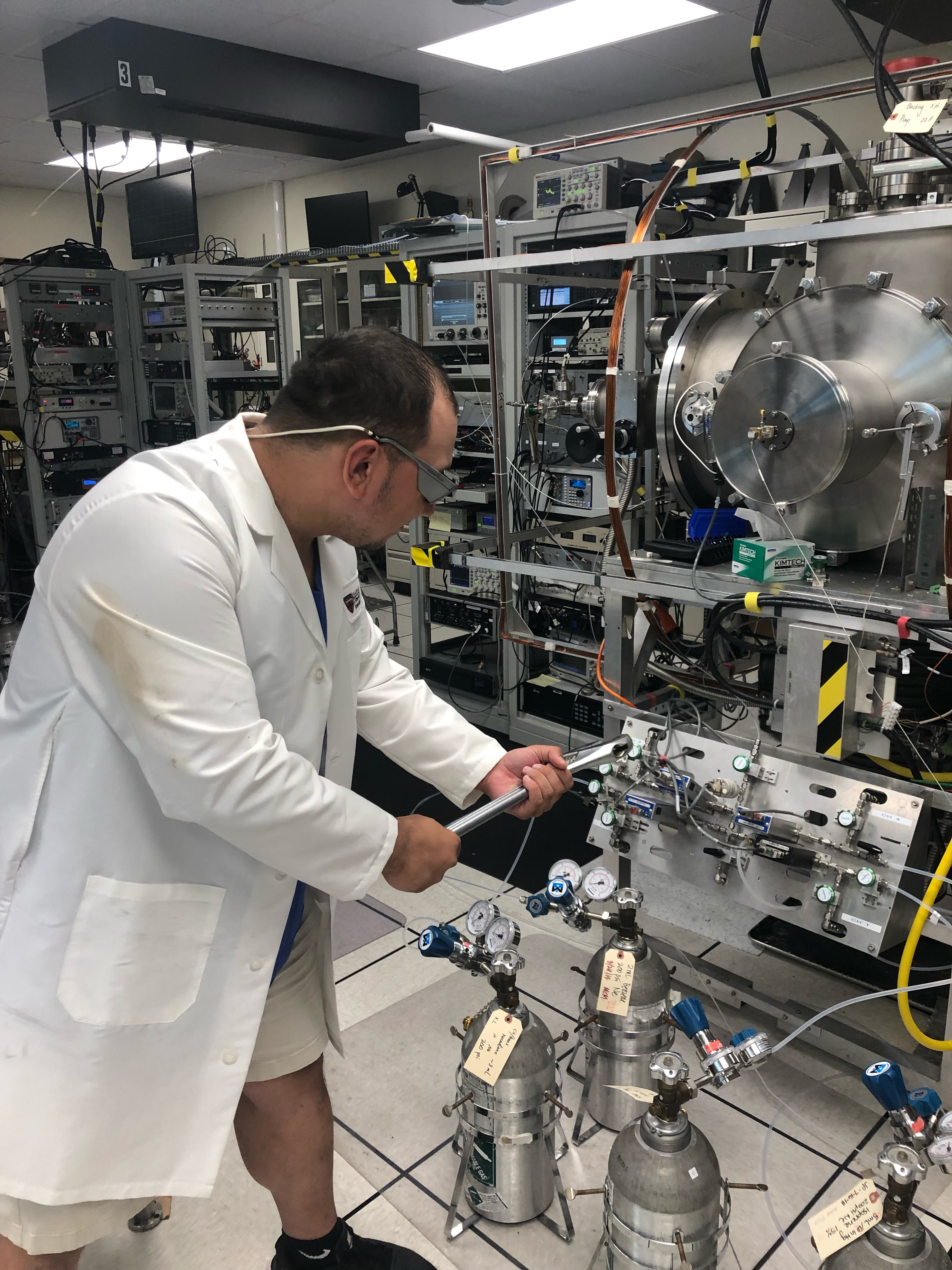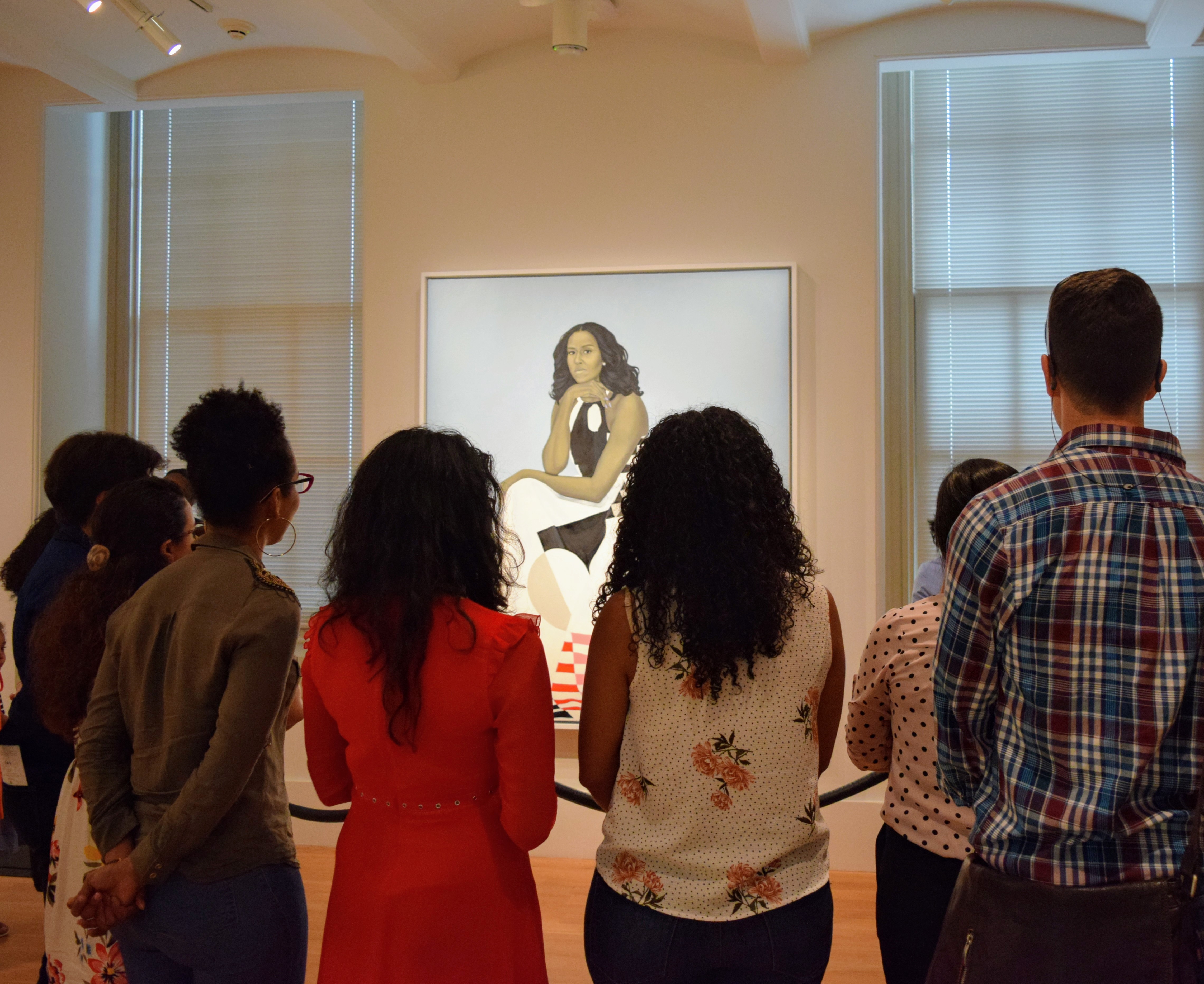 Astrophysics
Astrophysics
 SERC Tower
SERC Tower
 Art History
Art History
 Conservation
Conservation
Information for Fellows and Visiting Scholars, Scientists or Visiting Students on Appointments at the Smithsonian Institution
Table of Contents
Smithsonian Hosts/Advisors
Unit Appointment Coordinator
Background Checks for SI Identification Badges, and Network accounts
Equal Employment Opportunity (EEO) Training
Rights and Responsibilities
Stipends
Travel Allowance
Research Allowance
Medical Insurance
Visas
Tax Information
Use of Smithsonian Facilities
Publications
Vacation and Sick Days
Housing
Smithsonian Hosts/Advisors
Your Smithsonian host or advisor will be of primary assistance in acquainting you with the resources relevant to your research and introducing you to members of the department where you will be working. You have probably already been in touch with your host or advisor, but you should definitely contact him or her in advance to make plans for meeting on the first day of your appointment.
Unit Appointment Coordinator
Your unit appointment coordinator will assist you with your background check and in obtaining your Smithsonian identification badge, and in providing other necessary information. This person is identified in your award letter.
Background Checks for SI Identification Badges and Network accounts
The Smithsonian requires that everyone complete a favorable background check prior to obtaining access to Smithsonian network systems. ID badges are provided for in-residence appointments of more than 30 days are contingent upon successful clearance of a background security investigation.
Equal Employment Opportunity (EEO) Training
All Smithsonian (SI) academic appointees (Interns, Fellows, Research Associates) in residence with a SI program are required to complete the Smithsonian’s online Equal Employment Opportunity (EEO) Training – EEO 300 course.
Rights and Responsibilities
Fellows must comply with these standards of conduct. If there is any doubt that an activity or planned activity is in compliance, Fellows should immediately seek the advice of their Advisor(s).
Failure to comply with the following standards is cause for revoking the Fellowship appointment.
A Fellow must:
- follow legal requirements and other applicable standards for conducting research in the discipline, such as those for collecting, obtaining import permits and using live animals or human subjects (see SD 604, Misconduct in Research; SD 605, Animal Care and Use; SD 606, Research Involving Human Subjects; SD 607, Responsible Conduct of Research Training; SD 608, Financial Conflict of Interest for National Science Foundation [NSF]- and Public Health Service [PHS]-Sponsored Projects; and SD 611, Export Compliance and Trade Sanctions Related to Research, Export and Museum Activities);
- adhere to the funding source disclosure requirements in SD 806, Smithsonian Policies on Publishing by the Institution and Individual Staff Members, and the funding source disclosure requirements otherwise applicable to SI staff in SD 103, Smithsonian Institution Standards of Conduct, Section 9(b), when the Fellow is publishing research findings under the SI affiliation;
- adhere to SD 103, Smithsonian Institution Standards of Conduct, Section 13(c), and provide an annual and any ongoing disclosures required by the SI Form 1085 if the Fellow is a PI or co-PI on an SI grant;
- adhere to applicable SI policy and/or written agreements between the Fellow and the SI regarding ownership and use of intellectual property generated as a result of the Fellowship, and be familiar with the provisions and processes set forth in all applicable directives, such as SD 102, Disclosing, Protecting, and Commercializing Inventions, and SD 609, Digital Asset Access and Use;
- adhere to SD 118, Privacy Policy, to ensure the protection of personally identifiable information (PII) and SD 119, Privacy Breach Notification Policy, when reporting any suspected or confirmed breaches of PII;
- adhere to the rules set by the Smithsonian Institution Libraries (SIL) and the Harvard-Smithsonian Center for Astrophysics library when using their resources and facilities;
- be aware of and guided by the generally accepted professional standards and codes of ethics applicable in his or her professional field(s);
- exhibit appropriate professional conduct and behavior, respect others, and cooperate in the enforcement of the prevention of workplace harassment as set forth in SD 214, Equal Employment Opportunity Program; and
- adhere to SD 120, Scientific Diving Policy, when applicable.
In addition to complying with the above standards, a Fellow must not:
- misrepresent the relationship with the SI, particularly in any way representing him- or herself as an employee of the SI;
- directly or indirectly profit from, or permit others to profit from, information obtained through the Academic Appointment, which is or would be unavailable to external scholars or the general public;
- solicit or accept any gift that is or appears to be offered because the Fellow holds an Academic Appointment or may have influence within the SI;
- use official SI letterhead and similar materials, mailing privileges, or equipment, or supplies for anything not related to official SI business;
- solicit or promote the sale of any goods or services on SI premises through the use of SI resources or facilities, including email;
- operate SI motor vehicles or off-road equipment unless the Host Unit determines that such use qualifies as official SI business as described in SD 421, Mobile Asset Fleet Management, which provides that authorized operators may drive a motor vehicle or off-road equipment on SI official business only;
- reproduce copyrighted material (owned by the SI or a third party) in the absence of specific approval to do so from the rights-holder(s), unless permitted by fair use; and
- receive, spend, or commit funds, such as grants or contracts to the SI or grants from within the SI, without the approval and active fund management of the Host Unit’s administrative staff.
A Fellow with access to collections, whether in the Host Unit or elsewhere, must be aware of and adhere to his or her respective unit’s collections management policy and SD 600, Collections Management. Access to and use of collections must be approved in advance by the appropriate unit staff employee in accordance with established policy and procedures. A Fellow working directly with SI collections must disclose to his or her Advisor any personal activity that may create or seem to create conflicts of interest, such as collecting or dealing in similar objects, materials, or specimens.
A Fellow who becomes aware of any facts or circumstances giving rise to conflicts with the above-stated principles must immediately disclose such facts and circumstances to the Fellow’s Advisor(s).
Media Release
As a fellow, you give permission to the Smithsonian Institution to use, and to authorize the Smithsonian’s donors, funders, supporters and collaborators permission to use, materials that may include your name, image, voice, likeness and work product produced by you as part of your Smithsonian academic appointment, in brochures, publications, online and other formats for educational and museum purposes.
Intellectual Property
As a fellow, you may generate original research and related content (e.g., text, images, videos, graphs, databases, etc.) that is based on or derived from the collections, resources, equipment, facilities, property, data (including but not limited to data generated by Smithsonian equipment), and staff expertise of the Smithsonian. You own copyright only in original research and related content created as a fellow, subject to Smithsonian’s ownership rights in the underlying Smithsonian content. When your research is published, you agree to provide appropriate credit to the Smithsonian and those who you have collaborated with.
Stipends
Smithsonian Fellowship stipends are not considered salary or compensation, but are awarded to help support a fellow’s research efforts during the tenure of their appointment. The amounts and disbursement schedules of stipends and allowances are specified in individual award agreements. Please be advised that these funds are considered to be taxable along with all other income received from the award (see Tax Information section below).
Travel Allowance
If offered an one-time travel allowance is intended to assist with the researcher’s relocation from the place of residence to the Smithsonian. Please be advised that these funds are considered to be taxable along with all other income received from the award (see Tax Information section below).
Research Allowance
If awarded, the research allowance is intended for research-related expenses as proposed in the application. Please be advised that these funds are considered to be taxable along with all other income received from the award (see Tax Information section below).
Medical Insurance
Recipients of research appointments of three months or longer are eligible for insurance under group health plan options offered through the Smithsonian. You also may obtain this insurance for eligible dependents: your spouse, your unmarried children under 19 years of age. Please be advised that the amount contributed by the Smithsonian toward insurance coverage is considered to be taxable income.
Visas
When a foreign national is awarded a Smithsonian appointment to come to the United States for research, they are usually eligible to apply for a visa as an exchange visitor (category J-1). Even if it would otherwise be possible for a foreign visitor to enter the U.S. without this type of visa, it is the most appropriate category for research visits. Also, the proper visa status has important consequences for the taxation of fellowship awards to all non-U.S. citizens.
The Smithsonian’s Office of Global Affairs (OGA) will provide an enabling document used to apply for the visa, called a DS-2019, for foreign nationals on Smithsonian research appointments.
Foreign nationals already in the U.S. on visas obtained through sponsorship by other institutions should provide the following: a copy of the visa, a copy of the I-94, a copy of the enabling document (ex. IAP-66, DS-2019 or I-20, I-797, etc.) and a copy of any other documentation which is relevant to the visa. We will consult the OGA to determine if renewal, extension or transfer procedures will be necessary. Note: Holders of H-1B visas may not be paid through stipend awards.
All “J” visa holders are required to have insurance with specific medical coverage while in the U.S. Detailed information on these insurance requirements will be mailed to you with the visa certification.
Tax Information
This information is being offered as a courtesy only for fellows and interns receiving a stipend through the Smithsonian, and is not intended to provide individual tax advice.
Fellows and interns are solely responsible for determining their own tax liability and complying with all applicable tax laws and reporting obligations.
Because income tax liability varies on a case by case basis, the Smithsonian cannot give advice on an individual's taxes. The Internal Revenue Service website includes extensive information about tax obligations for fellowship and internship recipients, www.irs.gov. Also, you may refer to the IRS Publication 970 “Tax Benefits for Education” found at or Publication 54 “Tax Guide for U.S. Citizens and Resident Aliens Abroad” found at http://www.irs.gov/pub/irs-pdf/p54.pdf. Otherwise the publications may be obtained from any IRS office or by calling 1-800-829-3676. In addition, you may consult your own tax advisor.
US Citizens and US Permanent Residents for Tax Purposes
All funds provided under this appointment, including the stipend and any allowances (travel, research and health insurance, if provided), may be subject to income tax. However, the funds are not subject to self-employment (social security) tax. Stipend recipients are responsible for including the entire award in their income tax return for each full or partial tax year during which funding is received.
Stipend recipients who are U.S. citizens or residents will not receive an IRS tax form (W-2 or 1099) because fellows and interns are not deemed to be employees or contractors of the Smithsonian. This also means that social security taxes are not withheld by the Smithsonian from stipend payments. Fellowship income of U.S. citizens and resident aliens is not considered to be income derived from a trade or business and is not, therefore, subject to self-employment (social security) tax.
Other Tax Information
All awardees may be subject to additional income taxes imposed by the government of the state of their residence such as Washington, D.C., Virginia, or Maryland. These taxes are not as high as federal taxes, and they often follow federal exemption rules. However, awardees must acquaint themselves with specific regulations in their places of residence. If awardees reside in the jurisdiction for more than 183 days of the year, District of Columbia and Maryland tax returns must be filed by April 15 of each year. Virginia returns are due by May 1. Local taxes on sales of goods and services must be paid by non-resident aliens as well as by U.S. citizens and resident aliens; there are no provisions for exemptions from these taxes.
Use of Smithsonian Facilities
Awardees will be provided with appropriate space to conduct their research within the departments to which they are assigned, and with the equipment necessary for their work. The amount of assistance available to the researcher will depend upon the workload of the department and the policy of the department chair. The Office of Fellowships encourages researchers to contact their hosts/advisors in advance of their arrival to discuss their needs for equipment, supplies, computer time, and departmental support. This may enable researchers to make better arrangements for transporting items needed at the Smithsonian. It also allows sponsoring units or departments to plan for space and research needs. Research privileges at the Library of Congress may be arranged through the Smithsonian Institution Libraries.
Publications
We cannot offer any financial assistance for the publication of manuscripts, even those produced while actually in residence at the Smithsonian. It is requested, however, that the Smithsonian Institution be acknowledged in any publication resulting from the research conducted under this appointment, and we would appreciate receiving copies or citations of such publications.
Final Reports
A final report is required from each researcher summarizing his/her research activities while at the Smithsonian. These reports must be submitted through your host/advisor to the Office of Academic Appointments and Internships.
Vacation and Sick Days
Because of the limited period of tenure associated with a research appointment, no formal provision is made for vacation or sick leave. During a twelve-month appointment, up to three weeks of leave for vacation or illness is considered reasonable; however, individual arrangements must be made with the researcher’s Smithsonian advisor/host. Otherwise, awardees are expected to be engaged in their research at the Institution unless they have the approval of their host/advisor and have notified the Office of Academic Appointments and Internships. Please note that Federal Holidays are observed for all Smithsonian employees and academic appointees.
Housing
Researchers whose appointments are not at a Smithsonian unit in Washington, DC will either receive advance information on housing near the site of their appointment from the fellowship coordinator at that unit, or are asked to contact their host/advisor to inquire about housing possibilities.
For researchers who will be in the Washington, DC area, we suggest that you obtain an issue of The Washington Post Sunday Classifieds section prior to your arrival in Washington, DC. The Post’s Classifieds Section can also be accessed online (https://www.washingtonpost.com/classifieds/). In addition, many area universities provide housing information on their campus bulletin boards. Still, finding housing in Washington can be a time-consuming process. You may wish to consider these factors before you start searching:
* Most apartments require a 30-day notice from departing tenants. Managers may not know if any apartments will be available until one month before vacancy. Therefore, you may need to arrange for temporary housing when you first come to Washington, D.C.
* The neighborhoods in Washington, D.C. (and to a lesser extent, those in the surrounding areas) can vary greatly within just a few blocks. Be sure to check out the security of the neighborhood before you make your final decision.
* Washington, D.C. is an expensive city and rents are high. You may wish to consider living in the suburbs with access to the bus or subway.
* Some real estate agencies provide free information regarding rental properties.
* Leasing furniture for an unfurnished apartment may be cheaper than a furnished apartment.
* Parking is limited in many areas. Ask about off-street parking and parking regulations in the neighborhood if a parking space/lot is not provided with an apartment.
Maps and information about the Metro subway system and Washington, DC area rail and bus systems can be found online at www.wmata.com.
We hope this information will be useful to you before and during your appointment. If you have questions, concerns, or problems regarding any matter related to the appointment, please do not hesitate to contact the Office of Academic Appointments and Internships at InternsAndFellows@si.edu.